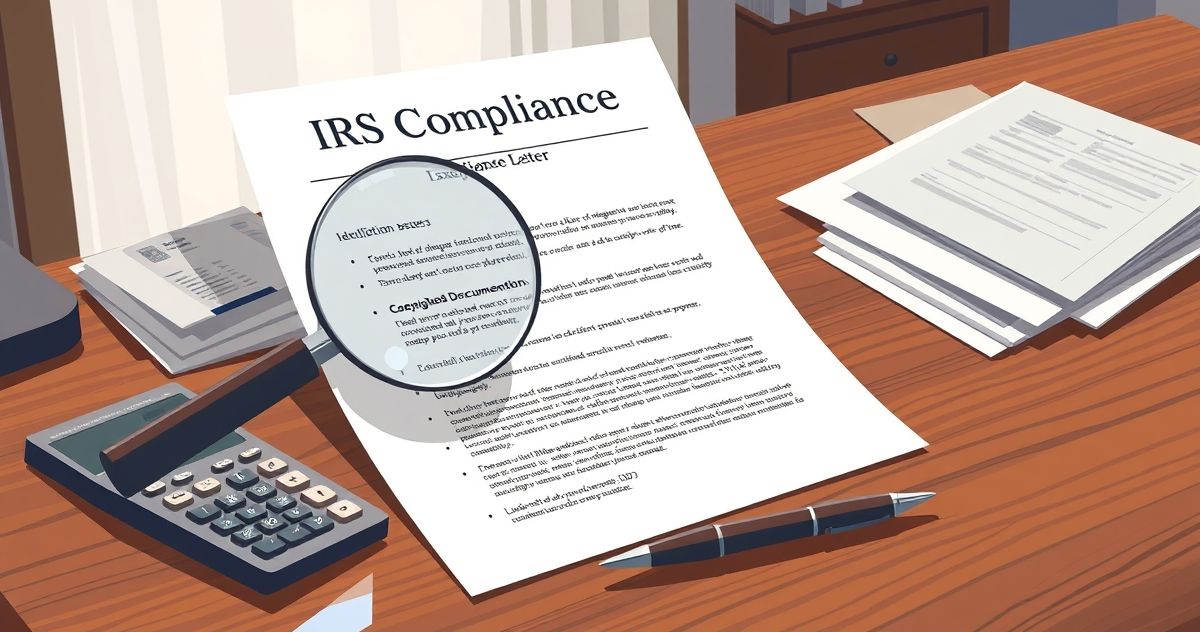What is an IRS Compliance Letter?
An IRS Compliance Letter is a formal notification sent by the Internal Revenue Service (IRS) to inform taxpayers about issues or discrepancies identified within their tax returns or related filings. These letters are part of a broader effort by the IRS to ensure that taxpayers accurately report their income, expenses, and other relevant financial information. Such letters can vary in nature and severity, ranging from informational requests to notifications of potential penalties if corrective action is not taken promptly.
Primary Purpose of IRS Compliance Letters
The main objective of an IRS Compliance Letter is to alert taxpayers to specific issues or requirements that need their attention. The IRS uses these letters as a tool to encourage compliance with tax laws and regulations, ultimately ensuring the accuracy and integrity of the tax system. Different types of compliance letters might focus on varied aspects such as incorrect income reporting, missed taxes, or documentation inconsistencies that need resolution.
Key Features and Components
IRS Compliance Letters typically include several critical components to guide taxpayers in understanding the issue at hand and the necessary steps to take. Key features include:
- Identification of the Issue: The letter will specifically mention the discrepancy or issue that has been identified. This could involve inconsistencies in reported income, credits, or deductions.
- Required Documentation: Taxpayers may be requested to provide additional documentation or evidence to support their previous filings. This ensures that any misunderstandings or errors are rectified accurately.
- Actionable Steps: Clear instructions on what the taxpayer needs to do to address the issue are provided. It may involve amending a return, paying additional taxes owed, or simply providing further information.
- Deadline for Response: A specified timeline within which the taxpayer must respond is often included. Adhering to this timeline is crucial to avoid potential penalties or further actions by the IRS.
Relevant Filing or Compliance Requirements
When an IRS Compliance Letter is received, it’s crucial for taxpayers to understand the relevant compliance requirements that apply. This might involve filing amended returns or providing detailed records that substantiate the claimed income, deductions, or credits. Often, compliance requirements highlighted in these letters are tied to specific issues found during internal reviews conducted by the IRS or upon information compared from third parties such as payroll companies or financial institutions.
Penalties or Consequences for Non-compliance
Failing to address an IRS Compliance Letter can lead to severe consequences. The IRS might impose additional taxes, interest charges, or even penalties. In more serious cases, continued non-compliance could trigger audits or enforcement actions such as liens and levies. Taxpayers failing to resolve issues may also affect their future dealings with the IRS, potentially leading to complications with subsequent tax filings or additional scrutiny.
Importance of IRS Compliance Letters
IRS Compliance Letters are vital for maintaining the integrity of the tax system and ensuring taxpayer adherence to regulations. For taxpayers, these letters present a chance to correct errors and adjust filings to meet IRS standards, thus avoiding potential future penalties or legal issues. From a broader perspective, compliance letters also help the IRS efficiently manage its resources by targeting discrepancies and promoting voluntary compliance instead of implementing widespread audits.
The significance of these letters extends beyond simple error correction. They serve as a proactive tool for taxpayers to engage with the IRS, rectify oversights, and maintain a clear record of compliant tax behavior. By responding effectively to these letters, taxpayers can bolster their standing and potentially prevent more serious repercussions.
Conclusion
An IRS Compliance Letter is an essential component of the tax resolution toolkit, offering a structured approach to addressing mismatches or errors within taxpayer records. Understanding and responding to these letters is crucial for maintaining compliance and ensuring financial transparency. This proactive engagement not only minimizes potential assessments of penalties and interest but also strengthens the taxpayer’s relationship with the IRS through evidence of diligence and adherence to tax regulations.
To make the most of IRS Compliance Letters, taxpayers should carefully review each piece of correspondence, verify their records, and seek professional advice if needed. Staying informed and prepared can turn these letters into opportunities for correction and improvement, ultimately supporting healthier financial practices.

